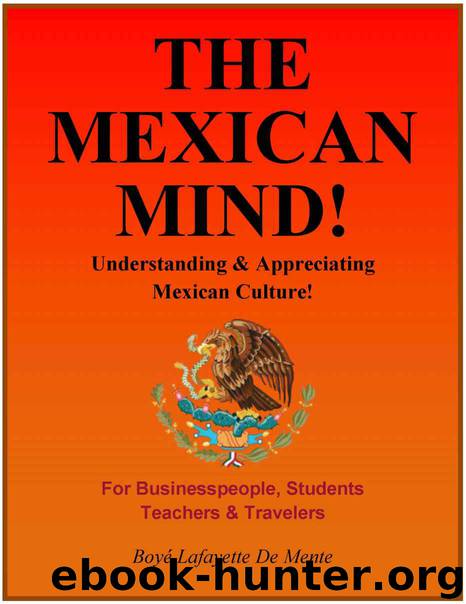THE MEXICAN MIND! - Understanding & Appreciating Mexican Culture! by Boye De Mente

Author:Boye De Mente
Language: eng
Format: mobi
Publisher: Phoenix Books/Publishers
Published: 2011-12-02T23:00:00+00:00
JUNTOS
(HUNE-tohs)
"Mexican Togetherness"
It is an established fact that people who experience things toge-ther, regardless of the nature of the experiences, develop special bonds. It also appears that when such experiences are difficult and a great deal of suffering is involved, the tighter and longer-lasting the bonds.
Historically, there are few people who have suffered more than the Spanish-Indian mixed-bloods who now make up over 60 percent of Mexico's population.
From the beginning of their history during the first years of the Spanish colonialization of Mexico, the majority of the mixed-bloods were made to suffer virtually every pain and in-dignity known to man.
It was not until the mixed-bloods of Mexico outnumbered and managed to out-fight their oppressors that they were able to recognize themselves as a "new race" and to begin creating an acceptable identity for themselves.
One of the most significant Mexican characteristics to come out of this crucible of suffering was an extraordinarily strong feeling of cultural and racial juntos or "togetherness."
However, the juntos of mixed-blooded Mexicans does not always apply on an individual personal basis except in the case of family and friends. Outside of family and friend relation-ships, they tend to be isolated, with strongly antagonistic feel-ings simmering just below a facade of civility.
These feelings of isolation and antagonism, a legacy of their history of powerlessness and hopelessness, are easily ruffled, and when disturbed typically result in outbursts of violence.
It is also these feelings of repressed rage that result in the savage cruelty that has traditionally been common among Mexi-can bandits, criminals in general, the military and police forces.
Because of its perverted origin the juntos of Mestizos applies more to groups than to individuals. Outside of their intimate circles they tend to view individuals as potential competitors or enemies, and to remain at arms length from them.
But mixed-blooded Mexicans identify strongly with their vil-lage, their city, their region and their country, and with Mexico in general. Just as the Japanese commonly invoke their deepest feelings of racial and cultural pride in the ringing phrase, Ware ware Nihonjin! (Wah-ray wah-ray Nee-hoan-jeen!) or "We Jap-anese!," Mestizos invoke similar feelings by references to themselves as a whole.
Because the togetherness of Mestizos is a personalized thing, however, unidad or "unity" in Mexico has been limited to personal spheres. The unity that has existed among Mestizos derives from racial and cultural uniqueness and from personally oriented social cohesion, with little political element involved.
Politics in Mexico has traditionally been far too removed from the people and far too negative to engender feelings of national togetherness, unity or pride; a fact that played into the hands of the Catholic church, which was unified, and to the appearance and temporary success of a long line of military warlords who ruled the country as their personal fief.
It was not until the 1990s that the political leaders of Mexico began to show significant signs of respecting the rights and the will of the people and making genuine efforts to eliminate the abuses that had kept the government an enemy of the people rather than a friend for more than four centuries.
Download
This site does not store any files on its server. We only index and link to content provided by other sites. Please contact the content providers to delete copyright contents if any and email us, we'll remove relevant links or contents immediately.
Cecilia; Or, Memoirs of an Heiress — Volume 1 by Fanny Burney(32546)
Cecilia; Or, Memoirs of an Heiress — Volume 2 by Fanny Burney(31943)
Cecilia; Or, Memoirs of an Heiress — Volume 3 by Fanny Burney(31929)
The Great Music City by Andrea Baker(31916)
We're Going to Need More Wine by Gabrielle Union(19034)
All the Missing Girls by Megan Miranda(15951)
Pimp by Iceberg Slim(14488)
Bombshells: Glamour Girls of a Lifetime by Sullivan Steve(14054)
For the Love of Europe by Rick Steves(13905)
Talking to Strangers by Malcolm Gladwell(13346)
Norse Mythology by Gaiman Neil(13345)
Fifty Shades Freed by E L James(13232)
Mindhunter: Inside the FBI's Elite Serial Crime Unit by John E. Douglas & Mark Olshaker(9318)
Crazy Rich Asians by Kevin Kwan(9277)
The Lost Art of Listening by Michael P. Nichols(7490)
Enlightenment Now: The Case for Reason, Science, Humanism, and Progress by Steven Pinker(7306)
The Four Agreements by Don Miguel Ruiz(6744)
Bad Blood by John Carreyrou(6611)
Weapons of Math Destruction by Cathy O'Neil(6264)
